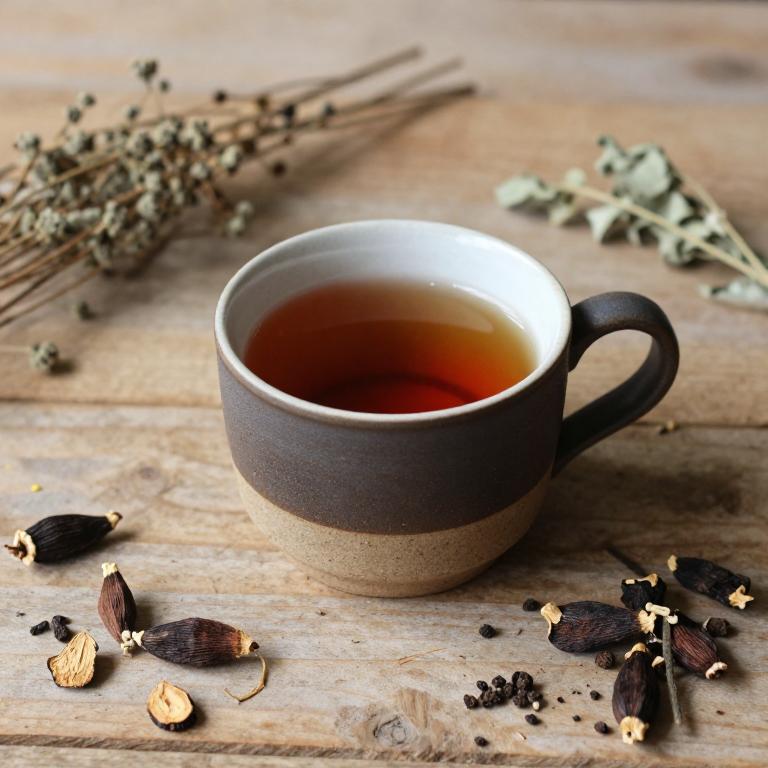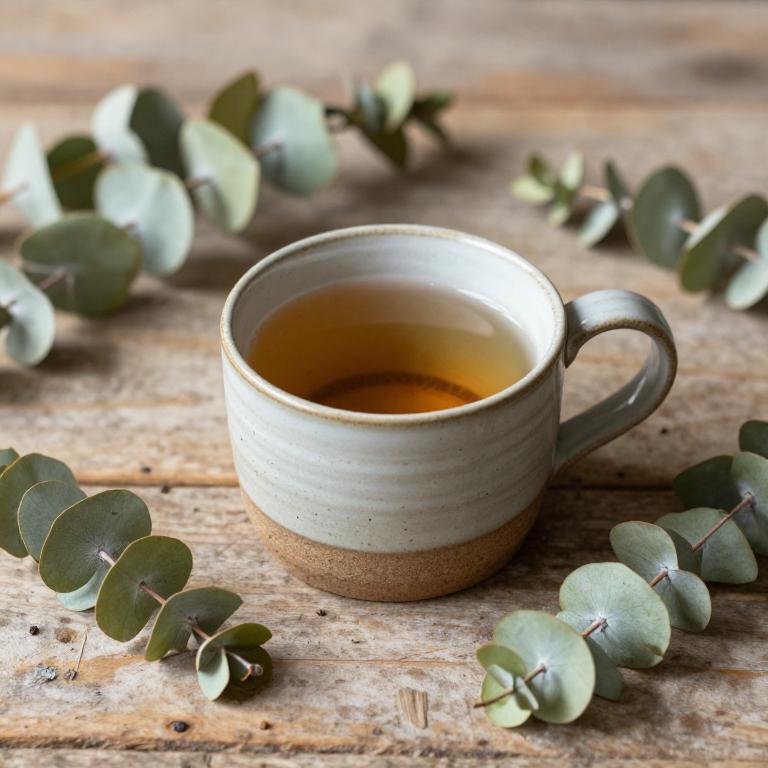10 Best Herbal Teas For Shortness Of Breath

Herbal teas can be a natural and soothing remedy for individuals experiencing shortness of breath, offering potential relief through their calming and anti-inflammatory properties.
Certain herbs like chamomile, licorice root, and eucalyptus are commonly used in herbal teas to help ease respiratory discomfort and improve airflow. These teas may help reduce inflammation in the airways and promote relaxation, which can alleviate symptoms associated with conditions such as asthma or bronchitis. However, it is important to consult with a healthcare professional before using herbal teas, especially for those with chronic respiratory conditions or who are taking medications.
While herbal teas may provide some comfort, they should not replace prescribed medical treatments for shortness of breath.
Table of Contents
- 1. Salvia (Salvia officinalis)
- 2. Black pepper (Piper nigrum)
- 3. Chamomile (Matricaria chamomilla)
- 4. Rosemary (Rosmarinus officinalis)
- 5. Fennel (Foeniculum vulgare)
- 6. Peppermint (Mentha piperita)
- 7. Licorice (Glycyrrhiza glabra)
- 8. Eucalyptus (Eucalyptus globulus)
- 9. Stinging nettle (Urtica dioica)
- 10. Echinacea (Echinacea purpurea)
1. Salvia (Salvia officinalis)

Salvia officinalis, commonly known as sage, has been traditionally used in herbal teas to support respiratory health and alleviate symptoms of shortness of breath.
The plant contains compounds such as rosmarinic acid and flavonoids, which may help reduce inflammation and improve lung function. When brewed into a tea, sage can soothe the airways and promote easier breathing, making it a popular remedy for mild respiratory discomfort. However, it is important to consult a healthcare professional before using sage tea, especially for individuals with chronic respiratory conditions.
While some studies suggest potential benefits, more research is needed to fully understand its efficacy and safety for treating shortness of breath.
2. Black pepper (Piper nigrum)

Piper nigrum, commonly known as black pepper, is traditionally used in herbal teas to support respiratory health.
While it is not a primary treatment for shortness of breath, some studies suggest that the active compound piperine may help improve lung function and reduce inflammation. Herbal teas made with black pepper can act as a mild stimulant, potentially aiding in clearing airways and enhancing breathing. However, it is important to consult a healthcare provider before using black pepper tea, especially for individuals with chronic respiratory conditions.
Overall, piper nigrum herbal tea may offer supportive benefits but should not replace medical treatment for shortness of breath.
3. Chamomile (Matricaria chamomilla)

Matricaria chamomilla, commonly known as chamomile, is a herbal tea often used for its calming and anti-inflammatory properties.
While it is traditionally used for relaxation and sleep, some studies suggest it may also help alleviate symptoms of shortness of breath by reducing airway inflammation and promoting respiratory comfort. Chamomile contains compounds like flavonoids and essential oils that can soothe the respiratory system and ease breathing in individuals with mild respiratory conditions. However, it is important to note that chamomile should not replace prescribed treatments for severe breathing difficulties.
Always consult a healthcare professional before using chamomile or any herbal remedy for respiratory issues.
4. Rosemary (Rosmarinus officinalis)

Rosmarinus officinalis, commonly known as rosemary, has been traditionally used in herbal teas to support respiratory health and alleviate symptoms of shortness of breath.
The essential oils in rosemary, particularly cineole and camphor, possess expectorant and bronchodilating properties that may help ease breathing by loosening mucus and relaxing airway muscles. When brewed as a tea, rosemary can act as a natural decongestant, promoting clearer airways and reducing inflammation in the respiratory system. However, it is important to consult a healthcare professional before using rosemary tea, especially for individuals with chronic respiratory conditions or those taking medications.
While rosemary may offer some relief, it should not replace medical treatment for severe or persistent shortness of breath.
5. Fennel (Foeniculum vulgare)

Foeniculum vulgare, commonly known as fennel, has been traditionally used in herbal teas to help alleviate symptoms of shortness of breath.
The essential oils in fennel, particularly anethol, are believed to have bronchodilatory effects that may help open up the airways and ease breathing. Fennel tea is often consumed as a natural remedy for respiratory conditions such as asthma or chronic bronchitis, supporting overall lung function. It is typically prepared by steeping the seeds in hot water and can be enjoyed either warm or cold.
While it may offer some relief, it is important to consult with a healthcare professional before using fennel tea as a treatment for persistent or severe shortness of breath.
6. Peppermint (Mentha piperita)

Mentha piperita, commonly known as peppermint, is often used in herbal teas to help alleviate symptoms of shortness of breath.
The essential oils in peppermint, particularly menthol, have a soothing effect on the respiratory system, helping to relax airway muscles and improve airflow. Peppermint tea can also help reduce inflammation in the airways, making it easier to breathe. It is often recommended as a natural remedy for individuals experiencing mild respiratory discomfort or bronchial irritation.
However, it is important to consult with a healthcare professional before using peppermint tea, especially for those with chronic respiratory conditions or who are taking medications.
7. Licorice (Glycyrrhiza glabra)

Glycyrrhiza glabra, commonly known as licorice root, has been traditionally used in herbal medicine for its potential respiratory benefits.
Licorice root tea may help alleviate symptoms of shortness of breath by soothing the respiratory tract and reducing inflammation. The herb contains glycyrrhizin, which has anti-inflammatory and expectorant properties that can ease breathing in individuals with conditions like asthma or chronic bronchitis. While licorice root tea is generally considered safe in moderate amounts, excessive consumption may lead to side effects such as hypertension due to its effect on cortisol levels.
It is advisable to consult a healthcare professional before using licorice root tea, especially for those with pre-existing health conditions.
8. Eucalyptus (Eucalyptus globulus)

Eucalyptus globulus, commonly known as eucalyptus oil, is often used in herbal teas to help alleviate symptoms of shortness of breath.
The essential oils in eucalyptus globulus contain compounds like cineole and eucalyptol, which have expectorant and bronchodilator properties. These properties may help clear airways and ease respiratory congestion, making it beneficial for individuals experiencing mild breathing difficulties. However, it is important to consult a healthcare professional before using eucalyptus tea, especially for those with chronic respiratory conditions.
While some people find relief from its soothing aroma and mild decongestant effects, it should not replace medical treatment for severe or persistent shortness of breath.
9. Stinging nettle (Urtica dioica)

Urtica dioica, commonly known as stinging nettle, has been traditionally used in herbal medicine for its potential respiratory benefits.
Some studies suggest that nettle tea may help alleviate symptoms of shortness of breath by reducing inflammation and improving bronchial function. The tea is believed to support the body's natural detoxification processes, which can indirectly ease breathing difficulties. However, it is important to consult with a healthcare professional before using nettle tea, especially for individuals with chronic respiratory conditions.
While anecdotal evidence supports its use, more clinical research is needed to fully understand its efficacy for shortness of breath.
10. Echinacea (Echinacea purpurea)

Echinacea purpurea, commonly known as purple coneflower, is a popular herbal remedy often used to support immune function and reduce the frequency of colds and respiratory infections.
While it is not a direct treatment for shortness of breath, some studies suggest that its anti-inflammatory and antioxidant properties may help alleviate symptoms associated with respiratory conditions. Herbal teas made from echinacea can be soothing and may help ease breathing in individuals with mild respiratory discomfort. However, it is important to consult a healthcare provider before using echinacea, especially for those with chronic lung conditions or asthma.
As with any herbal remedy, echinacea should be used as part of a comprehensive approach to managing respiratory health.